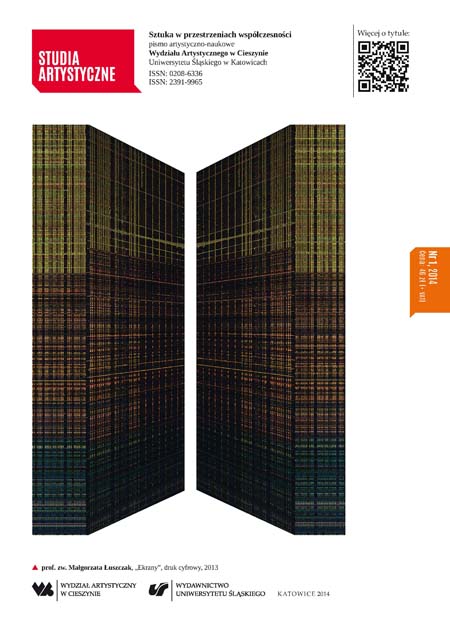Zakładnik piękna - koncepcja sztuki według Jarosława Iwaszkiewicza
A beauty hostage – a conception of art according to Jarosław Iwaszkiewicz
Author(s): Aleksandra Giełdoń-PaszekSubject(s): Fine Arts / Performing Arts
Published by: Wydawnictwo Uniwersytetu Śląskiego
Keywords: Iwaszkiewicz; fine arts; experiencing art; aesthetic views; culture
Summary/Abstract: Prose and poetic works, as well as diaries by Jarosław Iwaszkiewicz are permeated by the cult of beauty. Despite temporary doubts in its sense and the attempts to turn towards a real life, parnasism started in writer’s early works, changes in a real love to art and culture during his long life. In the case of music arts, it is somehow determined by writer’s professional education in this field. When it comes to plastic arts, it derives from self-education basing on constant visits to museums, returns to his favourite works of art, conversations on art with his friends-artists. Even at the end of his long life, Iwaszkiewicz feels a constant force to sightsee and constant admiration of art. The writer’s taste leaned towards classics (Correggio), but also those striking with their meaningful expression (Caravaggio), however, remaining within the boundaries of a realistic recognizability. Iwaszkiewicz admired Impressionism, too. He perceived works of arts through contemplation, permeation into the work’s content or even through conjecturing his own narrative motives on the basis of the plot initiated in a picture, which manifests a professional instinct of a writer. Iwaszkiewicz, though, despite grounded tastes, was a fussy art connoisseur. A work reception was often determined by his mood, personal situation or even weather, which he was aware of after all. Iwaszkiewicz’s attitude to art takes from a nineteenth century tradition of its reception. Art is a sense of life through which the world perception takes place. Communing with the beauty, an intuitive one at an intellectual, emotional and sensual level, brings comfort and metaphysical satisfaction. Searching for transcendence through art intensifies in prose ("Pasje błędomierskie") and poetry (a collection of poems "Inne życie") especially in the 1930s. Fine arts also play an important role in biographies of writer’s prose characters. Protagonists as Edgar Szyller from "Sława i chwała" or an old writer Zammoyłło from "Pasje błędomierskie" constitute to a great extent the writer’s alter ego when it comes to their opinions on art and writing. The problems of writing and creating, writer’s condition and the art-ethics opposition constitute a topic of many prose works by Iwaszkiewicz. The writer also reviewed books on art, writing column features to newspapers (published later on in "Rozmowy o książkach") on a daily basis where he clearly expressed his aesthetic views as well.
Journal: Studia Artystyczne
- Issue Year: 2014
- Issue No: 1
- Page Range: 20-29
- Page Count: 10
- Language: Polish

